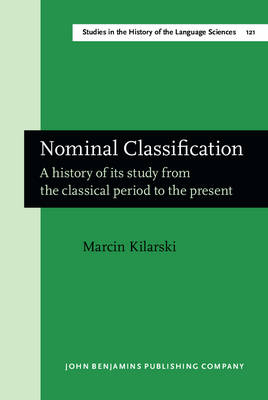
Nominal Classification
A history of its study from the classical period to the present
Seiten
2013
John Benjamins Publishing Co (Verlag)
978-90-272-4612-7 (ISBN)
John Benjamins Publishing Co (Verlag)
978-90-272-4612-7 (ISBN)
Based on an analysis of over 200 genetically and typologically diverse languages, this title shows that these seemingly arbitrary and redundant categories play in fact a central role in the lexicon, grammar and the organization of discourse.
This book offers the first comprehensive survey of the study of gender and classifiers throughout the history of Western linguistics. Based on an analysis of over 200 genetically and typologically diverse languages, the author shows that these seemingly arbitrary and redundant categories play in fact a central role in the lexicon, grammar and the organization of discourse. As a result, the often contradictory approaches to their functionality and semantic motivation encapsulate the evolving conceptions of such issues as cognitive and cultural correlates of linguistic structure, the diverse functions of grammatical categories, linguistic complexity, agreement phenomena and the interplay between lexicon and grammar. The combination of a typological and historiographic perspective adopted here allows the reader to appreciate the detail and insight of earlier, supposedly ‘prescientific’ accounts in light of the data now available and to examine contemporary discussions in the context of prevailing conceptions in the study of language at different points in its history since antiquity.
This book offers the first comprehensive survey of the study of gender and classifiers throughout the history of Western linguistics. Based on an analysis of over 200 genetically and typologically diverse languages, the author shows that these seemingly arbitrary and redundant categories play in fact a central role in the lexicon, grammar and the organization of discourse. As a result, the often contradictory approaches to their functionality and semantic motivation encapsulate the evolving conceptions of such issues as cognitive and cultural correlates of linguistic structure, the diverse functions of grammatical categories, linguistic complexity, agreement phenomena and the interplay between lexicon and grammar. The combination of a typological and historiographic perspective adopted here allows the reader to appreciate the detail and insight of earlier, supposedly ‘prescientific’ accounts in light of the data now available and to examine contemporary discussions in the context of prevailing conceptions in the study of language at different points in its history since antiquity.
1. Preface & Acknowledgments; 2. List of abbreviations; 3. 1.Preliminaries; 4. 2. Nominal classification systems: An overview; 5. 3. From Protagoras to the philosophical grammars; 6. 4. From the 'Romantics' to the Neogrammarians; 7. 5. Structuralism; 8. 6. Contemporary studies of gender/noun classes; 9. 7. Contemporary studies of classifiers; 10. 8. Final discussion; 11. References; 12. Index; 13. Index of biographical names; 14. Index of subjects and terms; 15. Language index
| Erscheint lt. Verlag | 18.12.2013 |
|---|---|
| Reihe/Serie | Studies in the History of the Language Sciences ; 121 |
| Verlagsort | Amsterdam |
| Sprache | englisch |
| Gewicht | 895 g |
| Themenwelt | Geisteswissenschaften ► Philosophie ► Sprachphilosophie |
| Geisteswissenschaften ► Sprach- / Literaturwissenschaft ► Sprachwissenschaft | |
| ISBN-10 | 90-272-4612-2 / 9027246122 |
| ISBN-13 | 978-90-272-4612-7 / 9789027246127 |
| Zustand | Neuware |
| Haben Sie eine Frage zum Produkt? |
Mehr entdecken
aus dem Bereich
aus dem Bereich
Macht und Legitimität politischer Sprache im Prozess der europäischen …
Buch | Softcover (2023)
Nomos (Verlag)
74,00 €
Wie die Menschheit zu ihrer größten Erfindung kam
Buch | Softcover (2022)
C.H.Beck (Verlag)
18,00 €


